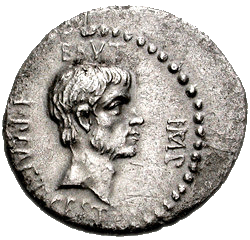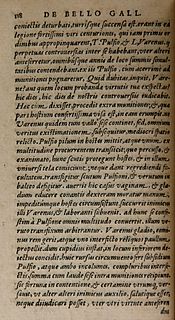Plot
Lucius Vorenus and Titus Pullo wash ashore on a small cay, after their ship is lost at sea. Without water, food, or any sign of rescue, they are nearly resigned to their deaths, when Vorenus notices the corpses of their dead comrades floating. The two men fashion a raft using several bodies to float it, and paddle out to sea.
In Julius Caesar's camp, Mark Antony and a small contingent of soldiers have arrived, but the majority of the 13th Legion has been lost at sea. Pompey's army has Caesar pinned down, and outnumbers his forces 3 to 1. Grimly, Caesar and Antony decide they have no choice but to make what will probably be their last stand from where they are.
In Pompey's camp, his officers consider the war all but over. Pompey knows that they need only wait, and starvation and weariness will cause Caesar's troops to desert. However, as predicted by Caesar, the politicians in the camp, led by Cato the Younger, want a decisive victory and pressure Pompey to attack. Cato and Scipio urge Pompey to crush Caesar in a final battle, reminding him of his reputation as a war hero. Pompey eventually gives in and agrees to attack Caesar.
In the ensuing battle, Caesar's forces inflict a devastating defeat on Pompey. Caesar, exhausted, staggers back into his tent and instructs Posca to send word of his victory to Rome, before collapsing.
In Pompey's camp, Cato and Scipio resolve to retreat to Africa and continue the war from there, although Brutus wearily remarks that they are "running out of continents" to flee to. Sick of fighting and the constant retreats, Cicero and Brutus both declare their intentions to surrender to Caesar and beg for his mercy. "I'm not afraid to die," Cicero declares in response to a sympathetic Scipio's comment they will probably be executed, "I'm tired, and I want to go home."
After they have left, Pompey consults with Scipio and Cato, and the three decide not to travel together. While the former make their way to Africa, Pompey makes his way with his wife and children to Amphipolis, posing as a traveling merchant.
In Caesar's camp, Cicero and Brutus are welcomed back with open arms by an ebullient Caesar. Befuddled, they remind him they are enemy combatants, but he will have none of it: "We are old friends, who have merely quarrelled." He invites them to share the table with the rest of his staff, who are busy celebrating the victory. Caesar is also overjoyed by their news that Pompey has survived Pharsalus, though disheartened to learn his old friend turned bitter enemy has no intention of surrendering.
When they reach the coast, Pompey's children come across Vorenus and Pullo washed ashore. Pullo and Vorenus recognize Pompey, though they conceal it. Pompey's party takes them in and gives them shelter and food.
Out of Pompey's earshot, the leader of his escort tries to recruit Vorenus and Pullo to help overpower Pompey's guards and take the family prisoner, promising a share of the rich reward Caesar will no doubt offer. Pullo is all for the suggestion, but Vorenus rejects it as dishonorable. The guide tries to ambush Vorenus, and Vorenus stabs him through the throat, alerting Pompey. Vorenus informs Pompey that he and his family are now officially prisoners of the 13th Legion.
In private, Pompey admits to Vorenus who he is. He tells an interested Vorenus how he was defeated at Pharsalus, then tearfully pleads that his family be allowed to make their way to freedom. Taking pity on the old man, Vorenus lets his party go, over Pullo's objections.
Pullo and Vorenus make their way back to Caesar's camp. Caesar is furious that Vorenus let Pompey go, but surprises Antony by letting Vorenus off with only a reprimand. When Antony argues Vorenus should be executed for such an error, Caesar explains that he believes Vorenus and Pullo are being protected by powerful gods, having recovered his missing Eagle in Gaul, stumbled upon a wagon full of treasury gold, survived a shipwreck that drowned the rest of their legion, and then found Pompey on a beach. He will not kill men "with friends of that sort."
In Rome, at Atia's urging and Servilia's invitation, Octavia has continued to visit Servilia's house. At first, Octavia is the supplicant, begging on her mother's behalf for help in keeping their house safe when the news of Caesar's defeat reaches Rome. But their positions are abruptly reversed when the news arrives that Caesar has triumphed, and Brutus's whereabouts are unknown. Servilia collapses with tears. Octavia comforts her, and then kisses her. The two women are later shown lying in bed together.
Pompey's party makes its way from Amphipoli to Alexandria in Egypt, confident of a warm welcome from the reigning king, Ptolemy XIII. While Cornelia and his children watch from their boat, Pompey is rowed ashore, where he is greeted by an ex-comrade from Spain, Lucius Septimius, now serving as a mercenary in the Egyptian army. Pompey reaches out to shake Septimius's hand, but Septimius seizes his arm and stabs him in the chest, sadly stating he is acting under orders. While Cornelia shields the children's eyes, she watches in horror as Septimius beheads Pompey and lets his corpse topple into the water.

This article concerns the period 49 BC – 40 BC.

Marcus Junius Brutus, often referred to simply as Brutus, was a Roman politician, orator, and the most famous of the assassins of Julius Caesar. After being adopted by an uncle, he used the name Quintus Servilius Caepio Brutus, which was retained as his legal name.

Gnaeus Domitius Ahenobarbus was a general and politician of ancient Rome in the 1st century BC.

Gaius Cassius Longinus, often referred to as simply Cassius, was a Roman senator and general best known as a leading instigator of the plot to assassinate Julius Caesar on March 15, 44 BC. He was the brother-in-law of Brutus, another leader of the conspiracy. He commanded troops with Brutus during the Battle of Philippi against the combined forces of Mark Antony and Octavian, Caesar's former supporters, and committed suicide after being defeated by Mark Antony.

Caesar's Civil War was one of the last politico-military conflicts in the Roman Republic before the establishment of the Roman Empire. It began as a series of political and military confrontations, between Julius Caesar, his political supporters, and his legions, against the Optimates, the politically conservative and socially traditionalist faction of the Roman Senate, who were supported by Pompey and his legions.
"The Stolen Eagle" is the series premiere of the British-American historical drama television series Rome. Written by series creator Bruno Heller and directed by Michael Apted, the episode first aired in the United States on Home Box Office (HBO) on August 28, 2005, and on the BBC in the United Kingdom and Ireland on November 2. Rome was given a budget of $100 million, making it the largest amount both networks had ever spent on a series. Heller centered the series' narrative on the perspectives of two common soldiers, similar to Rosencrantz and Guildenstern from Shakespeare's Hamlet. Apted shot the episode at Cinecittà, the Roman studio where the epic films Ben-Hur and Cleopatra were filmed. On the set, realism and authenticity were emphasized more than grandiosity, with depictions of a cosmopolitan city of all social classes.
"Stealing from Saturn" is the fourth episode of the first season of the television series Rome.
"The Ram has Touched the Wall" is the fifth episode of the first season of the television series Rome.
"Caesarion" is the eighth episode of the first season of the television series Rome.
"Utica" is the ninth episode of the first season of the television series Rome.
"Triumph" is the tenth episode of the first season of the television series Rome.
"The Spoils" is the eleventh episode of the first season of the television series Rome.
"Kalends of February" is the twelfth episode of the first season of the television series Rome.
"Passover" is the first episode of the second season of the television series Rome and is an Emmy Award winner in the category Outstanding Cinematography for a Single Camera Series photographed by Alik Sakharov, A.S.C.
"Son of Hades" is the second episode of the second season of the television series Rome.
"These Being the Words of Marcus Tullius Cicero" is the third episode of the second season of the television series Rome.
"Testudo et Lepus " is the fourth episode of the second season of the television series Rome.
"Heroes of the Republic" is the fifth episode of the second season of the television series Rome.
"Philippi" is the sixth episode of the second season of the television series Rome. The episode portrays the civil war between the Second Triumvirate and the combined forces of Marcus Junius Brutus and Gaius Cassius Longinus, murderers of Julius Caesar. The Battle of Philippi is featured in this episode.

Lucius Vorenus and Titus Pullo were two Roman centurions mentioned in the personal writings of Julius Caesar. Although it is sometimes stated they were members of the 13th Legion in fact Caesar never states the number of the legion concerned, giving only the words in ea legione, 'in that legion'. The legion concerned is never specified and there are therefore several possibilities, for example Legio IX Hispana. All that we learn is that the legion in which they served under Caesar was one commanded at the time by Quintus Cicero.





